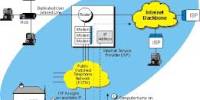There are more than 1.7 billion underbanked people worldwide, most of them in emerging markets. For them, accessing loans can be difficult, which is a problem that fintechs try to solve. One way to do this is to promote financial inclusion through underwriting through proprietary algorithms. One such organization is FairMoney, which describes itself as a “mobile banking revolution for emerging markets.” Founded by FairMoney, Lauren Hainy, Matthew Gendreau and Nicholas Berthozat, the unlicensed online provider that provides.
Three years after launching the mobile Nigeria service in Nigeria, the company set up shop in India, Asia’s second most populous country, in August 2020. Prior to the expansion, there was a significant increase in the distribution of FairMoney in Nigeria. Last year, it disbursed a total loan of $93 million, representing a 128% increase from 2018 and a 3,189% growth over its first year in 2019 towards the end of 2021. “I think we’ve been able to deliver 25-30% more than some of our competitors and I think we’re the market leader,” the company’s chief executive told Henry TechCrunch. However, compared to traditional banks, it was the seventh largest digital financial services provider in the region.

FairMoney has come a long way since its launch in Nigeria in 2013. The company had more than 1 million users in its first year of operation. Now, it claims that there 1.3 million unique users who have applied for more than 6.5 million loans. FairMoney offers loans ranging from ₦1,500 ($3.30) to, ₦500,000 ($1,110.00), with the longest loan facility standing at 12 months. According to the chief executive, there was a data-driven insight behind the choice to expand in India. The Indian market is very similar to Nigeria. In Asian countries, only 36% of adults have access to credit, leaving about 141 million people with a continuing market that does not serve microfinance banks. Unlike Nigeria, however, India has a better unit economy and a friendlier regulatory environment for business.
“If our ambition is to create a top mobile bank for emerging markets, we need to start with a very large market,” Hainy said. “We tested our products in 10 different markets by examining what the yield economy is like, NPL, risk cost, customer acquisition cost, infrastructure cost and how India stands like us.”
Since its expansion six months ago, FairMoney has claimed that more than half million-loan applications have processed from one million more unique users. This number comes down 5,000-6,000 loan applications per day, APR stands at 12.36%. Hein said the company has achieved this through zero advertising spending or marketing. Because of the risky supply behind international expansion, expanding beyond the shores of the continent is challenging for African-based startups. Although rare, there are several startups undertaking such a task. Last year, Nigerian fintech acquired Paga, an Ethiopian software company with a network of 15 million users and more than 24,000 agents rapidly track its expansion into Ethiopia and Mexico.
FairMoney is on a similar path. In addition, with more than 100 employees spread across Nigeria, France and Latvia, the company hopes to form an engineering and marketing team in India. Last month, Rohan Khara hired the services to facilitate becoming and expanding the Chief Product Officer (CPO). Khara has served as the former head of financial services for the Indonesian super app Gojek and has held senior roles at Microsoft, Quicker and MobiKwik. Hainy Khara’s experience with wealth in emerging markets – India and Indonesia – says FairMoney is poised for massive growth in Nigeria and India.
“We both need to fix financial services in emerging markets and for us Rohan has brought the ability to view the FairMoney scale from around ten million users to 10 or 20 million users.” Born in Germany to a Nigerian father and a German mother, Hainy started her entrepreneurial journey in 2015 by starting a food delivery company in Sweden. Seven months later, he founded Le Studio VC, a Paris-based startup studio and a €15 million fund he ran as chief executive for three years. “After these three years, I realized that being an investor was still not for me. I felt like I was very young and I wanted to create something on my own, “he said.
Neobanks such as Revolt in the United States and N26 in Germany sprang up across Europe. Hainy wanted to create something similar for Nigeria after seeing how much people were lacking in affordable financial services during a visit. However, despite studying other neo-bank models, Haney and his team have not been able to replicate them in developing markets like Nigeria. Credit still significantly underwritten by Nigerian banks due to the strict procedures employed in allocating Nigerian. Realizing an opportunity, they launched FairMoney as a new bank using the credit-first model. Like Nubank in Brazil, FairMoney began offering loans to solve credit problems. However, its broad vision is not only a digital bank but also a commercial bank.
The company is working towards getting a small bank license to work as a former Nigerian. However, according to the chief executive, the commercial bank license may take longer, possibly five to 10 years. “In the next five to ten years, I would like to think that there will be two new banks among the five largest commercial banks in Nigeria. We want FairMoney to be one of them, “he said. The Lagos and Paris-based Company raised $11 million in 2019 in the series. Now and in time it will get a commercial bank license, Haney said the company would raise the Series B goal to determine its position for the job.
















